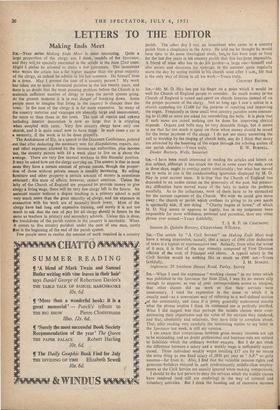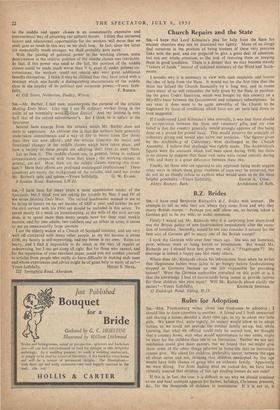SIR,—When I used the expression " working classes" in my
letter which was published in the Spectator for June 22nd, I was by no means silly enough to suppose, as one of your correspondents seems to imagine, that other classes did no work or that their services were unnecessary. I used the expression in the sense in which it is usually used—as a convenient way of referring to a well-defined section ,of the community, and since it is pretty generally understood exactly what the phrase implies I think its continued use is perfectly justified. What I did suggegt was that perhaps the middle classes were over- estimating their importance and the value of the services they rendered, and that, absolutely and relatively, they have little to complain about. That, after reading very carefully the interesting replies to my letter in the Spectator last week, is still my opinion.
I am aware that comparisons between gross money incomes are apt to be misleading, and no doubt professional and business-men are subject to liabilities which the ordinary worker escapes. Butt do not think the difference between a salary and a weekly wage is sufficiently appre- ciated. Three individual weekly wages totalling £17 are by no means the same thing as one fixed salary of,1850 per year as " A.P." so gaily assumes—far from it. Also, I find that the valuable pension rights and generous 'holidays enjoyed in such predominantly middle-class employ- ments as the Civil Service are usually ignored when making comparisons.
I should be the last person to deny the services which the middle classes have rendered (and still are rendering) in the way of cultural and voluntary activities. But I think the handing out of excessive. incomes to the middle and upper classes is an unnecessarily expensive and uneconomical way of obtainingour cultural leaven. I think that increased leisure and educational opportunities for the workers will mean that we shall gain as much in this way as we shall lose. In fact, since the latter are numerically much stronger, we shall probably gain more.
With the passing of political power to the working classes, some deterioration in the relative position of the middle classes was inevitable. In fact, if this power was used to the full, the position of the middle classes could be made much worse than it is, even if, under present cir- cumstances, the workers could not obtain any very great additional benefits themselves. I think it may be claimed that they have acted with a restraint which was hardly a distinguishing characteristic of the middle class in the heyday of its political and economic power.—Yours faith-
41 Gill Street, Netherton, Dudley, Worcs.























































 Previous page
Previous page